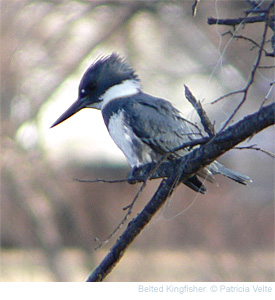|
LOCATION: Northeast Lake (OKC Zoo Lake) Contributed by: Nancy Vicars & Ernie Wilson 35.312017 N 97.275778 W DESCRIPTION OF AREA: A small lake and park with mostly oak trees plus several brushy hillsides. This is a public park and the gate is open from dawn to dusk. Ample parking is available in several locations on the south side of the lake with convenient access from I-35. There are areas where you can observe waterfowl from your parked car which is delightful especially for handicapped birders or in extreme weather conditions.
DRIVING DIRECTIONS: From: I-44 exit #129 onto ML King Blvd. and turn south at the 2nd traffic light. Turn east onto Remington Place continue past the zoo then turn right onto Grand Blvd. Year-round: Canada Goose, Mallard, Wood Duck, American Coot, Pied-billed Grebe, Great-blue Heron, Belted Kingfisher, Northern Cardinal, Blue Jay, American Crow, Red-tailed & Red-shouldered Hawks, American Kestrel, Mourning Dove, Red-winged Blackbird, Carolina Chickadee, Tufted Titmouse, Carolina & Bewick’s Wrens, Northern Mockingbird, White-breasted Nuthatch, Downy, Red-headed & Red-bellied Woodpeckers, Northern Flicker, Eastern Bluebird, American Robin, Common & Great-tailed Grackle and House Finch. Spring: Migrating Wood Warblers including Tennessee, Orange-crowned, Nashville, Northern Parula, Yellow, Chestnut-sided, Black-throated Green, Blackpoll, Black & White, American Redstart, Prothonotary, Ovenbird, Northern & Louisiana Waterthrush, Kentucky, Common Yellowthroat, Wilson’s, Canada & Yellow-breasted Chat. Blue-headed, Warbling, Red-eyed & White-eyed Vireos, Rose-breasted Grosbeak, Wood & Swainson’s Thrushes , Olive-sided, Least and Acadian Flycatchers, House Wren, Chipping and Clay-colored Sparrows. Summer: Mississippi Kite, Great & Snowy Egrets, Black-crowned & Yellow-crowned Night Herons, Green-backed & Little Blue Herons, Scissor-tailed, Great Crested, Western & Eastern Flycatchers, Eastern Phoebe, Summer Tanager, Eastern Wood-Pewee, Blue-gray Gnatcatcher, Gray Catbird, Brown Thrasher, Orchard & Baltimore Orioles, Field & Lark Sparrows, Barn, Cliff & Northern Rough-winged Swallows, Purple Martin, Common Nighthawk, Chimney Swift, Ruby-throated Hummingbird and Yellow-billed Cuckoo. Winter: Ducks species are generally plentiful and include American Wigeon, Redhead, Canvasback, Gadwall, Greater & Lesser Scaup, Green-winged Teal, Northern Pintail, Common Goldeneye, Ring-necked Duck, Northern Shoveler, Ruddy Duck, Bufflehead and Hooded Merganser. Double-crested Cormorant, Ring-billed & Bonaparte’s Gulls may also be present. Woodland birds include Great-horned Owl, Cooper’s & Sharp-shinned Hawks, Yellow-bellied Sapsucker, Yellow-rumped Warbler, Red-breasted Nuthatch, Hermit Thrush, Brown Creeper, Winter & Marsh Wrens, Cedar Waxwing, Ruby & Golden-crowned Kinglets, Spotted & Eastern Towhees, Fox, Song, Swamp, Lincoln, Harris’, White-throated & White-crowned Sparrows, Dark-eyed Junco and American Goldfinch. ACCIDENTAL: Bald Eagle, Roseate Spoonbill, Osprey, American White Pelican, American Bittern, American Avocet, Black-necked Stilt, Long-billed Curlew, Wilson’s Snipe and American Woodcock. There is the possibility of some great mammal sightings such as Fox, Bobcat, Deer and Coyote. BIRDING OBSERVATION LOCATIONS: RELATED LINKS: |

 In addition to the Oklahoma City Zoo, this lake is in the immediate vicinity of Remington Park Race Track, the Kirkpatrick Center OmniPlex, National Softball Hall of Fame and Lincoln Park Golf Course.
In addition to the Oklahoma City Zoo, this lake is in the immediate vicinity of Remington Park Race Track, the Kirkpatrick Center OmniPlex, National Softball Hall of Fame and Lincoln Park Golf Course.